COVID Pandemic Has Opened Olympic Door For Rapidly Developing Youngsters
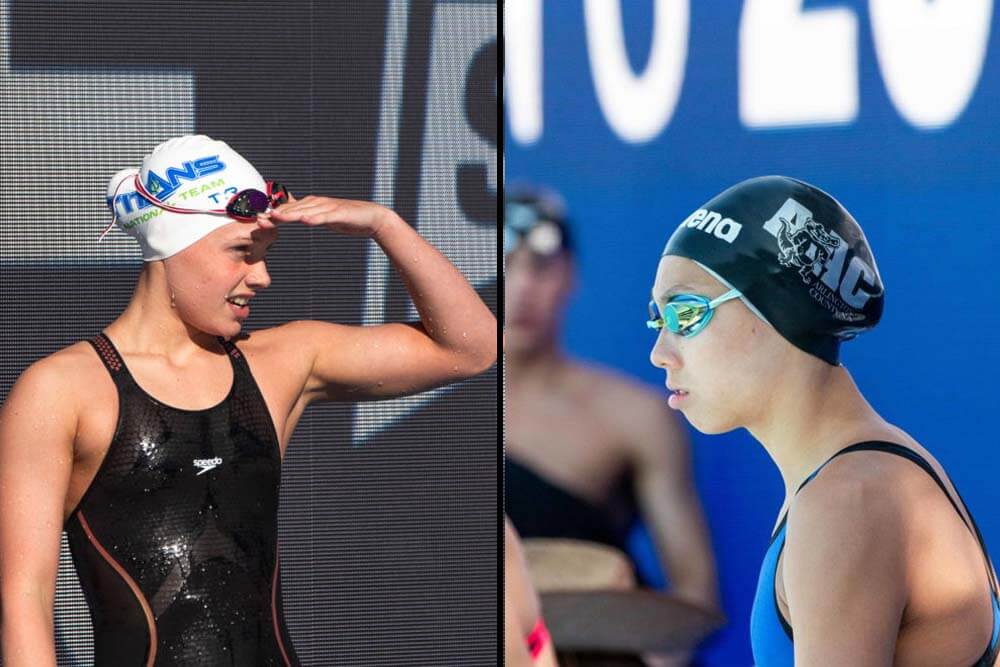
COVID Pandemic Has Opened Olympic Door For Rapidly Developing Youngsters
In less than a minute at an under-the-radar April swim meet in Cary, N.C., two teenagers changed the complexion of the women’s 100 butterfly in the United States. 16-year-old Claire Curzan swam a time of 56.20, and 18-year-old Torri Huske was just behind in 56.69. No other American woman has broken 57 since 2018.
But think back to a little over a year ago, when the COVID-19 pandemic began. At that point, Huske’s best was 57.48, and Curzan was at 57.87. Both were darkhorse candidates to make the U.S. Olympic team but little more. The one-year delay of the Olympic Games allowed the two teenagers to sufficiently improve to the point where both will be favorites at June’s Olympic Trials in Omaha, Neb.
And they aren’t the only swimmers to massively improve their stock since 2020.
Claire Curzan, USA
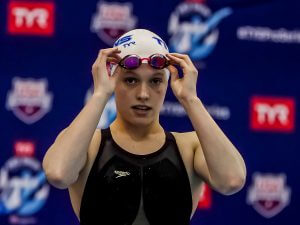
Claire Curzan — Photo Courtesy: Peter H. Bick
After her 56.20 100 fly, Curzan now ranks eighth all-time and second ever among Americans, behind only the 55.98 that Dana Vollmer swam on her way to Olympic gold in the event in 2012. Curzan has jumped ahead of Kelsi Dahlia, the top American in the event since 2017. Moreover, the 56.20 ranks fifth among current active swimmers, and the time would have been good enough to take silver behind Maggie MacNeil—and ahead of Sarah Sjostrom—at the 2019 World Championships.
Since then, Curzan has posted world-class times in other events, suggesting that she will be a challenger or even a favorite to make the Olympic team in more than just the 100 fly. In May, she posted a 24.17 in the 50 free to become the third-fastest American ever, behind only Olympic medalists Simone Manuel and Dara Torres. She became the eighth American woman to break 59 in the 100 back, swimming a 58.82, but that shapes up as the most competitive event of Olympic Trials and a tough field for Curzan to overcome. She has also been as fast as 54.40 in the 100 free.
Curzan has been a rising star in swimming, but she never would have been in the conversation for an Olympic medal had the Games gone off as scheduled in 2020. The extra year has made all the difference.
Torri Huske, USA
Huske is in the same boat as Curzan, and she’s now a Trials favorite in the 100 fly. While Curzan’s effort ranks first in the world this year, Huske ranks third (with Australia’s Emma McKeon just ahead of her), and all-time, she has moved into a tie for 15th. Among Americans, only Vollmer, Curzan and Dahlia have been faster.
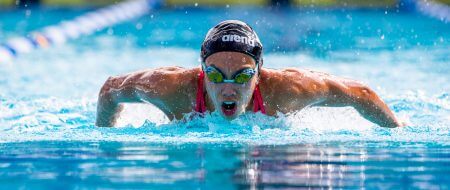
Torri Huske — Photo Courtesy: Connor Trimble
Huske also threw down a monster 100 free effort this weekend in Cary, her 53.46 jumping her to fifth in the world this year in the 100 free and fifth among Americans during the Trials qualifying period, trailing Manuel, Mallory Comerford, Abbey Weitzeil and Erika Brown, all professionals. With six swimmers to be selected for the Olympic team in the 100 free for relay purposes, Huske has a great shot here after dropping her lifetime best by more than a second in the past year.
On the final day of the Cary meet, Huske blasted her lifetime best in the 50 free by nine tenths. She put up a 24.44, moving her all the way to second in the U.S. during the qualifying period, just ahead of Weitzeil. She moved to sixth-fastest ever among Americans. So that’s three different events where Huske could find herself in the mix in Omaha, and she could be competitive in the 200 IM, as well. Her lifetime best of 2:11.18 ranks her sixth among Americans since 2018.
Evgeniia Chikunova, Russia
Evgeniia Chikunova won world junior championships in both breaststroke events in 2019, so she’s not exactly new to the scene, but the 16-year-old made a huge jump last week in twice knocking off veteran Yulia Efimova at Russia’s Nationals. Chikunova swam times of 1:06.06 in the 100 breast and 2:21.63 in the 200 breast. She now ranks second in the world in the longer event, and even though she has never competed at a senior-level international meet, the extra year gives her a little more prep time to be in medal contention come Tokyo.
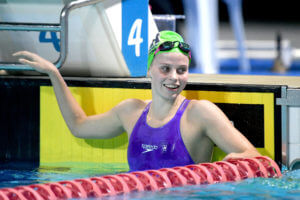
Elizabeth Dekkers
Elizabeth Dekkers, Australia
The fourth-fastest time of the year in the women’s 200 fly belongs to Elizabeth Dekkers, a 16-year-old from Queensland. She has cut more than a second off her lifetime best in the event since December, getting down to a 2:07.25. That would have been good enough to finish fourth at the 2019 World Championships, and she fills a huge hole for Australia: no swimmer from Down Under even swam in the semifinals at Worlds after Brianna Throssell finished 11th in prelims and then scratched.
Sam Short, Australia
Also this week, 17-year-old Australian Sam Short broke Kieran Perkins’ Australian All-Comers record in the 800 free with a 7:52.18 at the Australian Age Championships, and Short will be in contention to make Australia’s Olympic team in this event newly added to the Olympic schedule. Short added a 3:47.52 in the 400 free and a 15:02.48 in the 1500 free, the later a lifetime best by more than 18 seconds. His times are not yet quick enough to reach the final at the World Championships, but he will have a chance to improve and challenge veterans Jack McLoughlin and Mack Horton for Australia’s spots in the event in Tokyo.
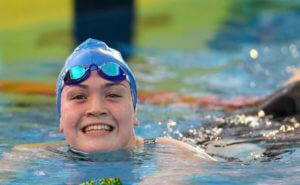
Erika Fairweather
Erika Fairweather, New Zealand
She finished 17th in the 400 free at the 2019 World Championships, but Erika Fairweather has taken a huge jump forward since then. Now 17, her improvement has put her on track for a spot in the Tokyo Olympic final. She has dropped her best time from 4:08.48 in 2019 to 4:07.43 in December and then 4:06.54 this week in Auckland. She did not swim fast enough to confirm her spot in Tokyo until October, but with the pressure of Olympic qualifying lifted, she could be in store for another drop in July.
Ethan du Preez, South Africa
South Africa has a pretty impressive recent history in the 200 fly with 2012 Olympic champion Chad le Clos leading the way, but he will have some company in Tokyo with 17-year-old countryman Ethan du Preez. Du Preez swam a 1:56.44 at South Africa’s Nationals this week to earn Olympic selection for the first time, and he will head to Tokyo with a time worthy of semifinal qualification at most major meets and just a few tenths short of what it took to make the final at the 2019 World Championships. This will also mark the first occasion that le Clos will have a countryman sharing the pool with him in the 200 fly.

Lydia Jacoby
Lydia Jacoby, USA
There has never been an Olympic swimmer from Alaska. Lydia Jacoby, a 17-year-old committed to swim at the University of Texas, could break that streak in 2021. She jumped into contention at this week’s TYR Pro Swim Series in Mission Viejo, improving her 100 breast lifetime best from 1:07.57 to 1:06.99 and then to 1:06.38, good enough for second place behind Olympic gold medalist Lilly King. During the Olympic Trials qualifying period, she now ranks third behind King and Annie Lazor. She’s by no means a Trials favorite at this point, but she has rapidly jumped into the mix.
Jacoby isn’t quite on the same level in the 200 breast, but she did drop a whopping five seconds this weekend, from 2:32.36 to 2:28.87 to 2:27.39.
Many Women’s 200 Butterflyers, USA
Hali Flickinger remains the big favorite in this event at U.S. Olympic Trials, with a 2019 time of 2:05.96 that surpasses any other swimmer globally in the past two years, and Regan Smith and Katie Drabot remain the top two contenders for the second spot in the event. But a substantial group of teenagers is knocking on that door, hoping that another year of improvement will give them a chance.
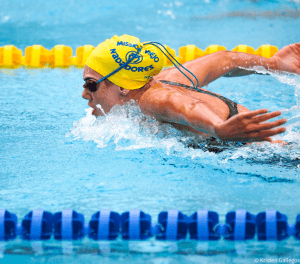
Katie Crom — Photo Courtesy: Mission Viejo Nadadores
Charlotte Hook, a 17-year-old teammate of Curzan’s at the TAC Titans, has been as quick as 2:07.87 back in 2019, and she narrowly missed her best time this weekend in Cary with a 2:07.99, suggesting a time drop to come. Lillie Nordmann, 18, has been as quick as 2:07.43, and she finished second this week at the TYR Pro Swim Series in Mission Viejo behind Katie Crom, a 17-year-old who defeated the field in a tight finish and swam a time of 2:10.38 that was just off her best time. All of these teenagers could find themselves in a tight mix in Omaha. Whoever is in contention on the last 50 and has something left in the tank could give themselves a chance to steal a spot in Tokyo, a spot that may not have been possible had the Trials gone off in 2020.




What no lockdown like the rest who had no pool or coaching.